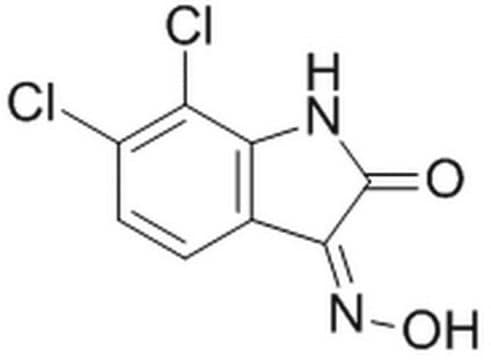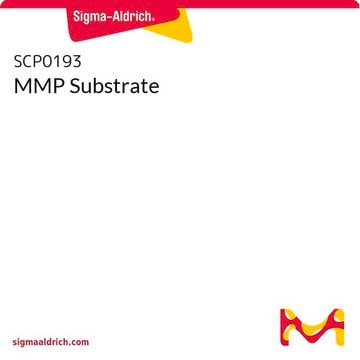GERPN2631
Matrix Metalloproteinase-2 (MMP-2) Biotrak™ Activity Assay System
Cytiva RPN2631, pack of 1 ea
Anmeldenzur Ansicht organisationsspezifischer und vertraglich vereinbarter Preise
Alle Fotos(1)
About This Item
UNSPSC-Code:
12352200
NACRES:
NA.32
Empfohlene Produkte
Verpackung
pack of 1 ea
Hersteller/Markenname
Cytiva RPN2631
Versandbedingung
dry ice
Lagertemp.
−20°C
Allgemeine Beschreibung
Biotrak™ MMP-2, Activity Assay System provides a simple, specific and precise quantitative determination of active or pro MMP-2 in tissue culture supernatants, serum, plasma, urine, synovial fluid and tissue homogenates. Active MMP-2 may be measured in the range 0.75 to 12 ng/mL and the sensitivity of the assay is 0.5 ng/mL. A longer incubation protocol enables an assay range of 0.19 to 3 ng/mL with a sensitivity of 190 pg/mL, should higher sensitivity be required. The assay uses the pro form of a detection enzyme that can be activated by captured active MMP-2, into an active detection enzyme, through a single proteolytic event. The natural activation sequence in the pro detection enzyme has been replaced using Protein engineering, with an artificial sequence recognised by specific matrix metalloProteinases. MMP activated detection enzyme can then be measured using a specific chromogenic peptide substrate. Standards and samples are incubated in microplate wells precoated with anti-MMP-2 antibody. Any MMP-2 present will be bound to the wells, other components of the sample being removed by washing and aspiration. Either the endogenous levels of free active MMP-2, or the total levels of free MMP-2 in a sample, can be detected. In order to measure the total MMP-2 content, any bound MMP-2 in its pro form is activated using p-aminophenylmercuric acetate (APMA). The standard is pro MMP-2 which is activated in parallel for both types of sample. Active MMP-2 is detected without APMA treatment. The resultant colour is read at 405 nm in a microplate spectrophotometer. The concentration of active MMP-2 in a sample is determined by interpolation from a standard curve. Each pack contains reagents for 96 determinations. This allows the construction of a standard curve plus the measurement of 42 samples in duplicate. The Biotrak™ MMP-2 activity assay has been specifically designed for research purposes.
Matrix Metalloproteinase-2, Biotrak™ Assay.
Matrix metalloproteinase-2 (MMP-2), also known as gelatinase or type IV collagenase, is a 72 kDa protein. MMP-2 is a member of matrix metalloproteinase (MMP) family of enzymes. The basic structure of MMP2 contains a signal peptide domain that targets the enzyme for secretion, the pro-peptide domain, which is removed when the enzyme is activated and the catalytic site containing gelatin-binding domain.
Biochem./physiol. Wirkung
Matrix metalloproteinase-2 (MMP-2) cleaves gelatin, type IV, V, VII, X, and XI collagens, fibronectin, elastin, laminin, proteoglycans and a range of non-extracellular matrix (ECM) components. Both MMP-2 and MMP9 play an essential role in matrix degradation and they are implicated in the maintenance of neovascularization. MMP-2 activity is associated with human ovarian follicular development. Its expression is elevated in human myocardial infarction and dilated cardiomyopathy. Wound fluid from chronic leg ulcers show elevated expression of MMP2. Overexpression of active MMP-2 affects wound healing in chronic leg ulcers. MMP2 activity is inhibited by tissue inhibitor of metalloproteinase-2 (TIMP-2). Human follicular fluid MMP-2 level acts as a potential biomarker of oocyte maturation in in vitro fertilization and intracytoplasmic sperm injection (ICSI) cycles.
Leistungsmerkmale und Vorteile
- Specific for MMP-2.
- Nonradioactive microplate-based assay.
- Precise, accurate, quantitative measurement.
- Applicable to complex biological samples.
- Ready-to-use detection enzyme and substrate.
- Equivalent sensitivity to ELISA.
Lagerung und Haltbarkeit
Please be aware this product may be shipped 30 days before the expiration date. For more information on the batch specific expiration date, please contact technical service.
Hinweis zur Analyse
To view the Certificate of Analysis for this product, please visit www.cytiva.com.
Rechtliche Hinweise
Biotrak MMP-2 and TIMP-2 Human ELISAs
These products are manufactured by FUJI CHEMICAL INDUSTRIES, Ltd. (Japan).
These products are manufactured by FUJI CHEMICAL INDUSTRIES, Ltd. (Japan).
Biotrak is a trademark of Cytiva
Signalwort
Danger
H-Sätze
Lagerklassenschlüssel
6.1B - Non-combustible acute toxic Cat. 1 and 2 / very toxic hazardous materials
Analysenzertifikate (COA)
Suchen Sie nach Analysenzertifikate (COA), indem Sie die Lot-/Chargennummer des Produkts eingeben. Lot- und Chargennummern sind auf dem Produktetikett hinter den Wörtern ‘Lot’ oder ‘Batch’ (Lot oder Charge) zu finden.
Besitzen Sie dieses Produkt bereits?
In der Dokumentenbibliothek finden Sie die Dokumentation zu den Produkten, die Sie kürzlich erworben haben.
Kunden haben sich ebenfalls angesehen
Matrix metalloproteinase 2 level in human follicular fluid is a reliable marker of human oocyte maturation in in vitro fertilization and intracytoplasmic sperm injection cycles.
Yang WJ, et al.
Reproductive Biology and Endocrinology, 13(1), 102-102 (2015)
Immunohistochemical expression of MMP-14 and MMP-2, and MMP-2 activity during human ovarian follicular development.
Vos MC, et al.
Reproductive Biology and Endocrinology, 12(1), 12-12 (2014)
Thrombospondin-1 suppresses spontaneous tumor growth and inhibits activation of matrix metalloproteinase-9 and mobilization of vascular endothelial growth factor.
Rodriguez-Manzaneque JC
Proceedings of the National Academy of Sciences of the USA, 98(22), 12485-12490 (2001)
Matrix metalloproteinases and myocardial infarction
Phatharajaree W
The Canadian Journal of Cardiology, 23(9), 727-733 (2007)
R T Aimes et al.
The Journal of biological chemistry, 270(11), 5872-5876 (1995-03-17)
The 72-kDa gelatinase/type IV collagenase (MMP-2) is a member of the matrix metalloproteinase (MMP) family of enzymes. This enzyme is known to cleave type IV collagen as well as degrade denatured collagens. However, native interstitial collagens are reportedly resistant to
Unser Team von Wissenschaftlern verfügt über Erfahrung in allen Forschungsbereichen einschließlich Life Science, Materialwissenschaften, chemischer Synthese, Chromatographie, Analytik und vielen mehr..
Setzen Sie sich mit dem technischen Dienst in Verbindung.










